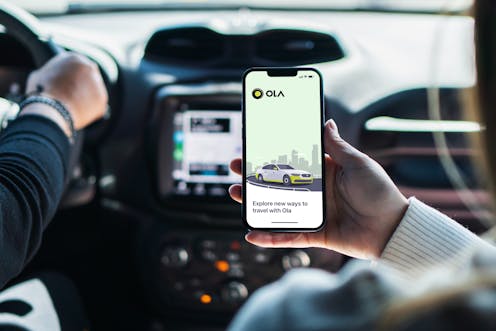Rideshare giant Ola has abruptly exited the Australian market. What does this mean for the future of ridesharing?
- Written by Neil G Sipe, Honorary Professor of Planning, The University of Queensland

Last week, Indian rideshare giant Ola announced that it would abruptly cease operations[1] in Australia, New Zealand and the UK.
A competitor to Uber, the company had been operating in Australia since 2018 and served most of our major cities – Sydney, Melbourne, Brisbane, Gold Coast, Adelaide, Canberra and Perth.
Ola versus Uber wasn’t exactly a David and Goliath story. In India, Ola dominates the rideshare market, with revenues three times greater than Uber’s. But its international takings have always been far more modest. Now, preparing to list on India’s stock exchanges, the company says its international withdrawal reflects a reassessment of priorities[2].
For Australia, there will now be less competition in an already concentrated market. Ola had been our third-largest[3] rideshare provider after Uber and Didi.
But Uber remains in a league of its own, with annual revenue more than 45 times that of Didi. Is Australia’s rideshare market now destined to become a monopoly?
Under pressure at home
Some have argued[4] that Ola’s business model has increasingly been under pressure in India, its largest and most important market.
Like many other ridesharing companies, the company took a big hit[5] during the pandemic.
But it has also struggled to attract and retain drivers[6]. Many Ola drivers in India can also work for hyperlocal delivery services such as Zomato, Swiggy and Dunzo, which can be done with a bike instead of a car. With similar earnings potential and lower operating costs, for many, running deliveries is a more attractive option than driving Ola.
A second issue has arisen[8] from Ola’s inevitable price increases. To first establish itself in the market, the company had offered huge discounts to encourage ridership. When these discounts ceased, Ola became far less competitive, prompting some users to buy a car or use carpooling apps instead.
With rival Uber continuing to apply pressure[9] on Ola’s market share in India, it makes sense the company would simplify operations and shift its focus home.
Impact on Australia
Ola’s departure represents further concentration in Australia’s rideshare market. Prior to it, seven ridesharing companies[10] were operating here: Uber, Didi, Ola, Shebah, InDrive, Bolt and GoCatch. This was down from a peak of 11 firms operating in 2022.
Uber continues to dominate the Australian market, accounting for 80%[11] of all rides in 2023.
Uber’s Australian rideshare revenue[12] in 2023 – A$646 million – dwarfed that of its nearest rivals Didi (A$14.3 million) and Ola (A$7.1 million) combined.
Uber’s heavy venture capital backing – more than US$24 billion[13] (A$37 billion) globally since its founding in 2010 – has helped it secure a strong footing. Ola, in comparison, has raised just over US$4 billion[14] (A$6.2 billion).
Such strong venture capital backing has allowed Uber to survive despite earning no profits from its ridesharing operations until last year.
Uber looks increasingly unassailable
Because of Uber’s sheer size, and its recent move into profitability[15], it has the resources to innovate and further cement its hold on the Australian market.
Some of its recent initiatives include providing rides in hybrid or electric vehicles (Uber Green[16]), working cooperatively with public transport operators[17], and venturing into the tour group business[18].
But Uber also has the resources to withstand class action lawsuits. One such lawsuit was filed in Victoria by 8,000 taxi and hire-car drivers impacted by Uber’s move into the Australian market.
Last month, just prior to the scheduled start of the trial, Uber agreed to a settlement of A$271.8 million[19], the fifth-largest class action settlement in Australian history.
Another lawsuit brought by the taxi-booking app GoCatch accuses Uber of trying to put GoCatch out of business[21] by identifying and recruiting GoCatch’s drivers.
Read more: Uber has settled a class action lawsuit for $270 million – what was it accused of?[22]
Winner takes all
Despite these legal challenges, there is little doubt that Uber will continue to dominate the Australian ridesharing market. And that market will continue to expand. Projections suggest that ridesharing company revenues will grow by more than 2% annually[23] over the next four years.
In the near future, we could well see the number of Australian rideshare operators continue to fall.
That doesn’t mean Australians will stop using ridesharing. But with less competition, the cost of doing so could rise.
References
- ^ abruptly cease operations (www.news.com.au)
- ^ reassessment of priorities (techcrunch.com)
- ^ third-largest (www.ibisworld.com)
- ^ Some have argued (blog.startupstash.com)
- ^ big hit (cio.economictimes.indiatimes.com)
- ^ struggled to attract and retain drivers (blog.startupstash.com)
- ^ Pradeep Gaurs/Shutterstock (www.shutterstock.com)
- ^ second issue has arisen (blog.startupstash.com)
- ^ continuing to apply pressure (thearcweb.com)
- ^ seven ridesharing companies (www.ibisworld.com)
- ^ accounting for 80% (www.ibisworld.com)
- ^ Uber’s Australian rideshare revenue (www.ibisworld.com)
- ^ US$24 billion (www.investmentcastle.com)
- ^ US$4 billion (pitchbook.com)
- ^ move into profitability (www.theverge.com)
- ^ Uber Green (esdnews.com.au)
- ^ working cooperatively with public transport operators (theconversation.com)
- ^ tour group business (www.skynews.com.au)
- ^ A$271.8 million (www.theguardian.com)
- ^ Rick Rycroft/AP (photos.aap.com.au)
- ^ accuses Uber of trying to put GoCatch out of business (www.smh.com.au)
- ^ Uber has settled a class action lawsuit for $270 million – what was it accused of? (theconversation.com)
- ^ 2% annually (www.statista.com)

















